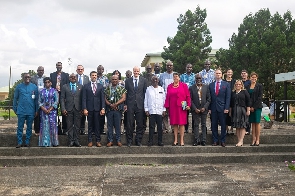The Ghana Atomic Energy Commission (GAEC) has held bilateral talks with the U.S. Department of Energy on nuclear technologies at Kwabenya in Accra. The meeting, which was held on the heels of President Nana Addo Dankwa Akufo-Addo's announcement last month that Ghana intends to pursue a nuclear power program for peaceful purposes, indicating the country’s readiness to go nuclear, was aimed at strengthening ties between the two intergovernmental organizations and also exploring areas of mutual interest. The Deputy Secretary of the U.S. Department of Energy (DOE), Mr. David Turk, who was accompanied by the US Ambassador to Ghana, Ms. Virginia Palmer, during his visit to the Commission, said the U.S. government is very much committed to the peaceful nuclear cooperation agreement with Ghana. He commended Ghana for taking the lead on several fronts, especially in the field of nuclear technology and its applications. According to Mr. Turk, nuclear technology has advantages and benefits for industry in the fields of medicine, agriculture, and employment opportunities, among others, in addition to providing power. He pointed out that the U.S. Department of Energy has committed billions of dollars to accelerate the development of Small Modular Reactors (SMR), a newer generation of reactors that offer many advantages, including safety, size, cost, and construction time, among others. The Deputy Secretary revealed that Ghana has an opportunity to consider SMR technology and that both countries can work together to take advantage of it. According to him, this could position Ghana as the centre for the production of this technology for the rest of the continent. He emphasized, "given your track record and history as a nation, our proposed partnership with you in terms of SMR technology will help provide an opportunity for Ghana to exercise regional leadership." For his part, the Board Chairperson of GAEC, Dr. Kwaku Aning, recounted the advances that have been made by the U.S. government in SMRs, which he said was an option available to Ghana, and that about 80 other different designs were being built across the globe. "We are now faced with coming together to decide on where to go from here, as we have advised the government from the technical point of view," he added. According to Dr. Aning, nuclear technology is one of the most powerful technologies in terms of its capacity to solve a myriad of societal problems. "Nuclear power is increasingly seen as a technology that does not only provide expansion to business and industry but also provides high-level employment opportunities to the many graduates from our universities,” he added. The Board Chairman thanked Mr. Turk and Ms. Palmer for their visit to GAEC and reiterated the importance of the close cooperation between GAEC and the US government while commending the U.S. government for its pivotal role and contribution to Ghana’s energy sector and other areas of nuclear infrastructure, technologies, security, and applications. "The pivotal role played by the US government during the establishment of the Nuclear Regulatory Authority to streamline the use of nuclear and other radioactive materials in Ghana is worthy of commendation," he noted. The US Ambassador to Ghana, Ms. Virginia Palmer, in her brief remarks, thanked the American delegation for the official visit to Ghana and for bringing on board the principles of the U.S. Department of Energy of protecting the planet and its commitment to equitable energy access in terms of quality and reliability. "We are happy to have Deputy Secretary Turk and our interagency colleagues here to discuss nuclear energy, particularly SMRs, a 123 Agreement and ongoing cooperation between Ghana and the U.S. government,” she said. The Director-General of GAEC, Prof. Samuel B. Dampare, also thanked the team for their visit and continued support for Ghana and the Commission. He conducted them around the research reactor, laboratories, and other facilities at the Commission. A technical session was also held behind closed doors between nuclear energy experts from the US government and their Ghanaian counterparts to discuss negotiating a 123 agreement.













